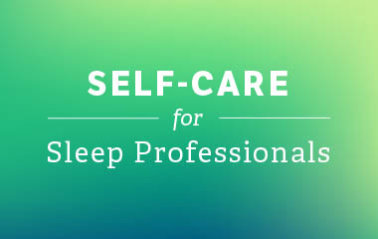While health care professionals, including many AASM members, are intently focused on their mission of providing patient care during the coronavirus pandemic, it’s just as important to make time for self-care. The stresses of this health emergency—long hours, difficult cases, equipment shortages, isolation from family and overall uncertainty— are taking a toll. You must care for yourself to care for your patients.
Of course, coronavirus isn’t just impacting frontline responders. Everyone faces new challenges and pressures. Practices have been thrust into uncertainty, scrambling to deliver care in new ways, labs are suspending testing, regular activities are in limbo.
In times of crisis, sleep professionals need to be resilient. Fortunately, resilience is a skill that can be learned. Take some time today to hear from sleep psychologist Dr. Emerson Wickwire, who shares strategies and tactics on incorporating self-care into our daily lives in this free webinar.
Dr. Wickwire will help you understand how to keep a level head, manage fears, stay focused, maintain perspective, keep busy and more. We’re in challenging circumstances, but we will get through it with resilience.
Watch Dr. Wickwire’s free webinar now or read on for his top tips for self-care.
During this crisis, and in any stressful time, Dr. Wickwire said it’s important to maintain perspective, take care of yourself and stay engaged. In his free webinar, he offered several easy tips to help us manage through challenging times to be poised to surpass our expectations when we’re back to normal.
Some of his top tips include:
- Relax your body. Tension is the number one performance killer, said Dr. Wickwire. We need to stay flexible, adaptable and nimble. He recommended patterned breathing – inhale for four counts, exhale for eight. Do this three times to help ease tension.
- Reduce your worry. Worry thrives on uncertainty, and the world is full of unknowns right now. To ease your concerns, name your fear, be clear about what you want (being less worried about your fear), think of ways to reach your objective, evaluate those options, then act. You’ll feel better by taking some control over your fears.
- Control your new work-from-home routine. Set a schedule of work time and personal time. Shut off email when it’s your family time. Give yourself time to unwind at the end of the day. Maintain a good bedtime ritual.
- Increase positive emotions. Focus on “what is” instead of “what if” to reduce distractions and stress. Use all of your senses to pay attention in the moment to be fully present.
- Write a gratitude list. It’s a powerful way to appreciate the small moments in the day.
- Stay connected. Technology makes this easy, so use texting, video and phone calls to keep in touch with friends and family. Host virtual group meetings, coffee breaks or cocktail hours.
- Establish your priorities. Define four key areas of importance and use them as filters for all of your tasks. Ask yourself what must be done and what can be delegated, then prioritize tasks by who they’re for, when they’re due, and how they can be done efficiently.





